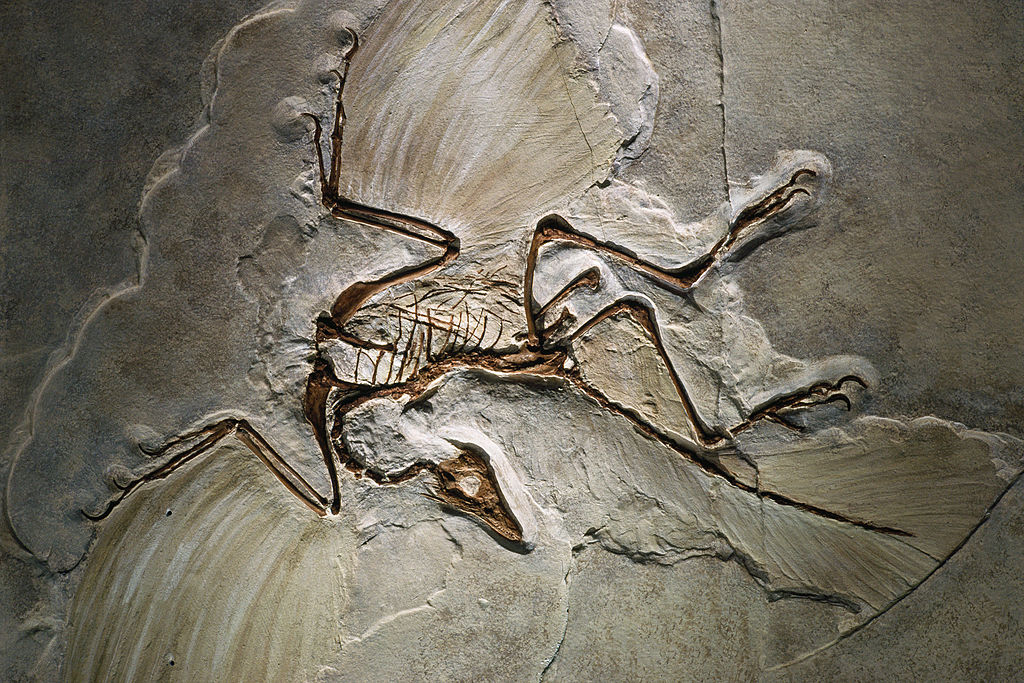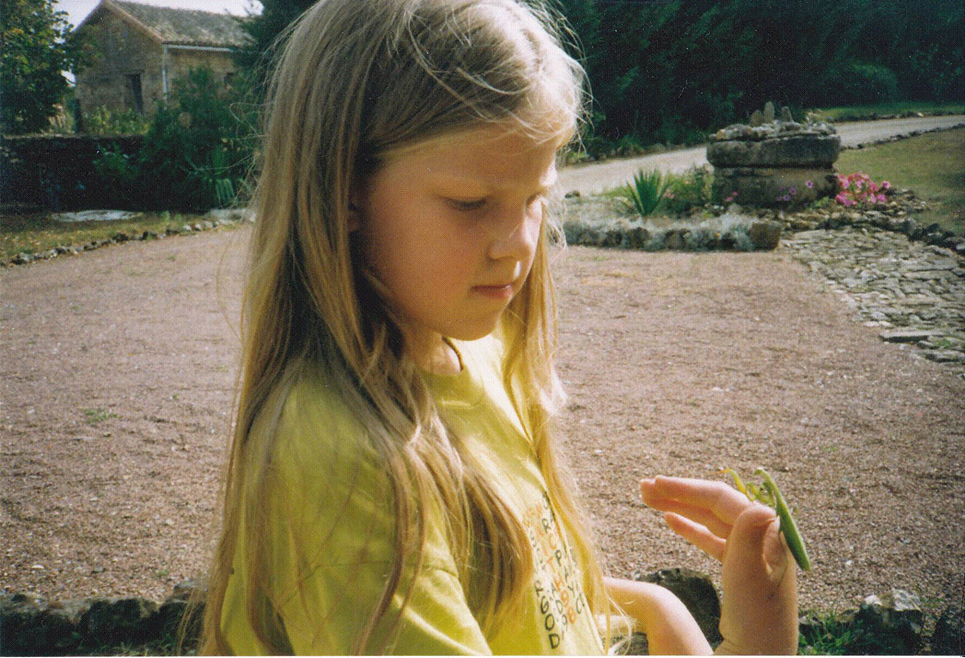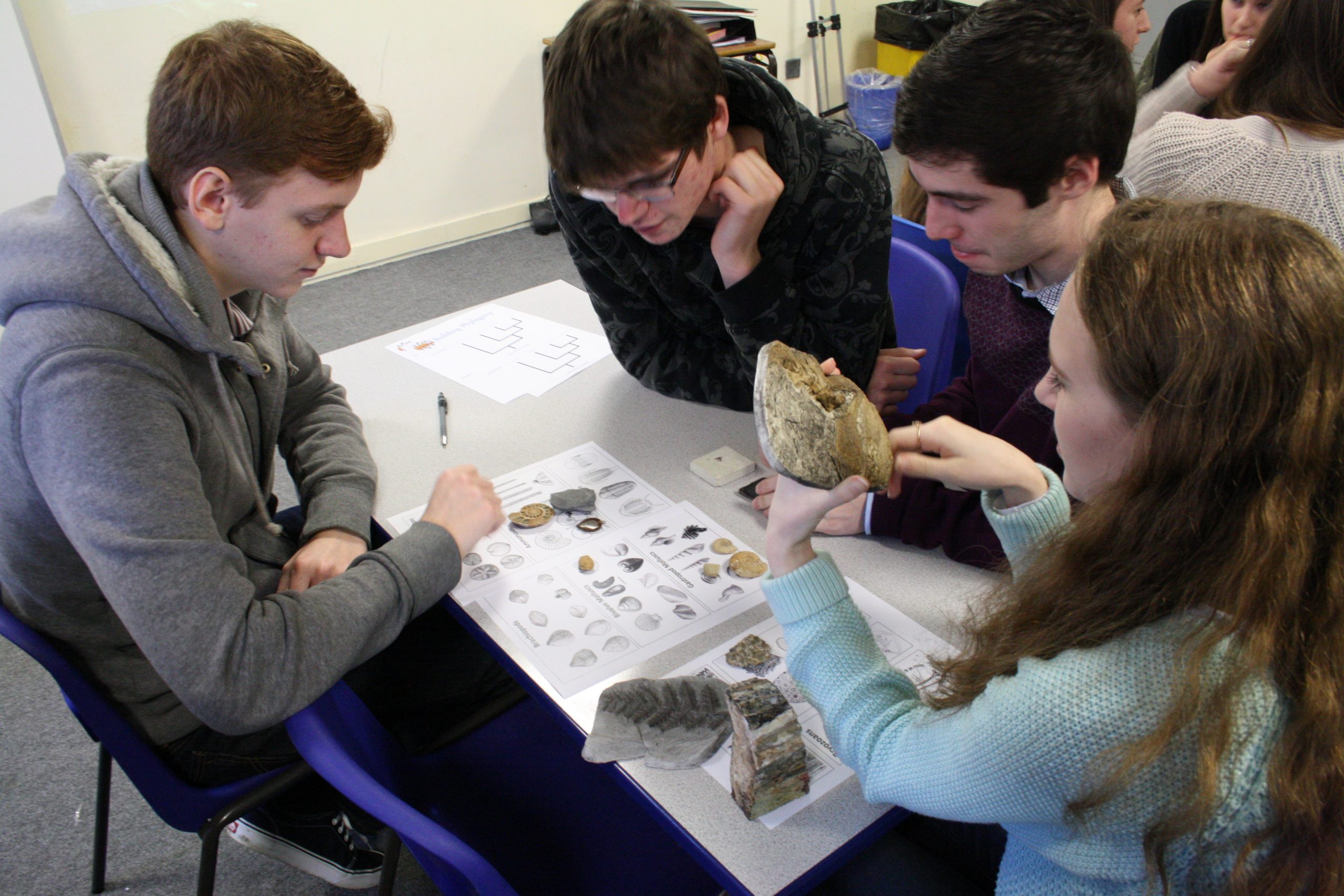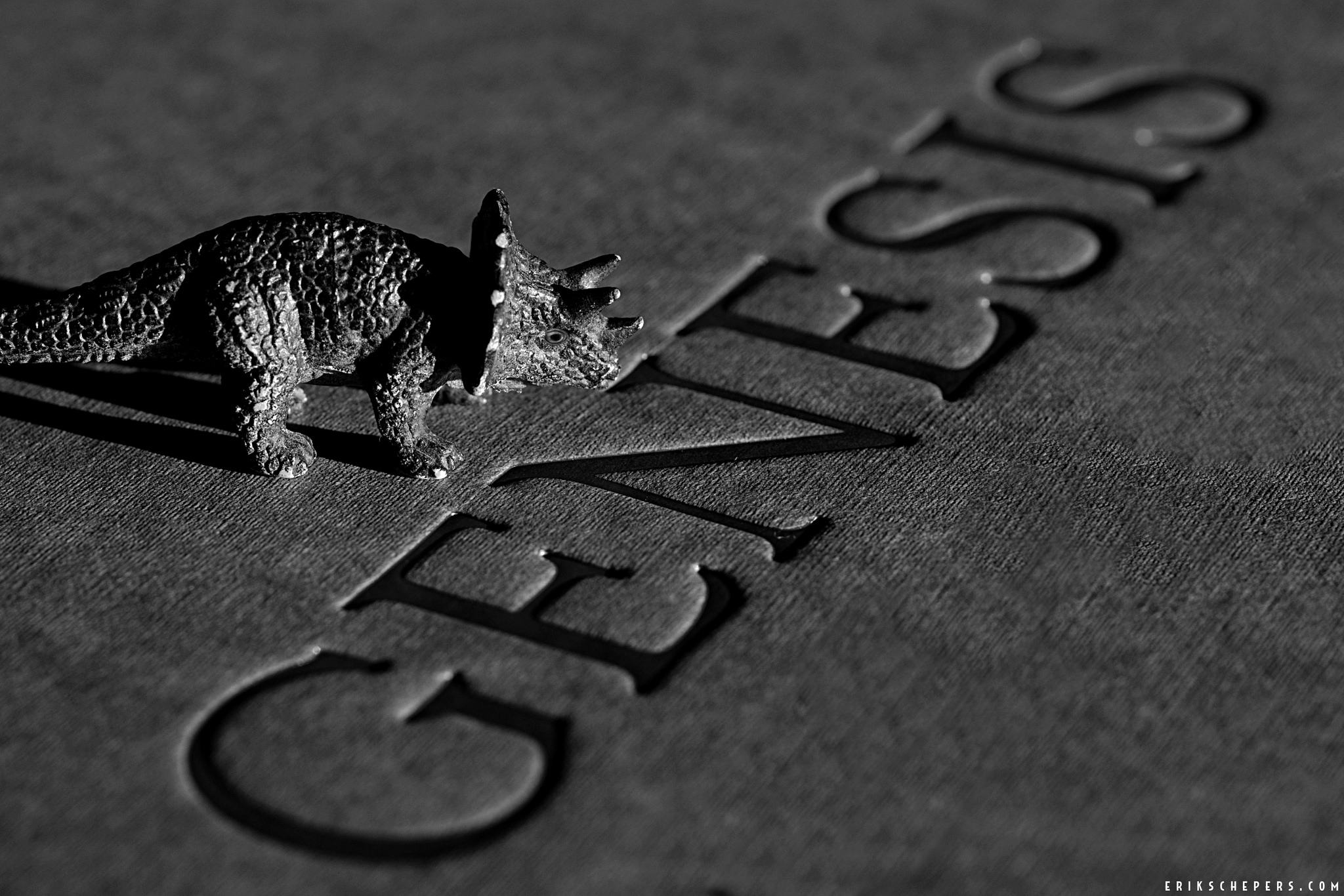
Archaeopteryx fossil By James L. Amos (National Geographic Society) [CC0], via Wikimedia Commons
Today I am excited to talk to Lizzie Coyle, evolutionary biologist and the youth and schools outreach officer for the Faraday Institute for Science and Religion. Among many other things Lizzie is the Institute’s go-to girl for all things fossilized. Can I start with a personal question? What first got you so excited about studying animals that are now extinct?

© Lizzie Coyle
Oh, you make it sound so interesting. Do you know, I don’t really know. I know that’s a terrible answer. I just really have always been fascinated. So when I was a kid, around two or three years old, learning to talk, you know you have conversations about what you want to be when you grow up. I remember having this conversation one time. My best friend wanted to be a housefly and my sister, who is 3 years older, wanted to be a lamppost. I announced to the world that I wanted to be a geologist. Nobody is quite sure where it came from. I was always fascinated by the living world – trees and bugs and animals and stuff, but rocks and shells as well. My mum in particular encouraged that. She was very into biology and the natural world, and we would go out collecting shells, caterpillars, bits of rocks and stuff. It just grew from there, I think.
As part of your educational role at the Institute you and your travelling fossil collection conduct hands on science workshops talking about evolutionary history. What sort of audiences do you talk to and what’s the aim for these sessions?

© God and the Big Bang
I talk to any audience, really, anybody who wants us. Within the schools work anybody from about the age of three up to, generally, sixteen, seventeen and eighteen. We have lots of staff in as well, so I talk to them, have done some staff training sessions and occasionally they let me loose talking to groups of adults as well. We have a lot of fun in schools because you get so many great questions.
Really the point of them is to provide an opportunity for young people to think about questions they don’t normally get the chance to. In school everything is divided up into subjects and they’re often quite focussed on getting through an exam at the end of the year. You have particular sort of topics you have to cover and everything’s very geared towards ‘these are the questions you are going to be asked and you know, that’s what we have to get through’. And that means that different subjects can become quite boxed off from each other. Science is taught in one way. This is the way we learn about the world. Here are the facts. And then you walk out of that room, walk into another room, and suddenly you’re doing RE or learning about Christianity, Islam or all these kind of things, and they never really get the chance to interact.
So what happens when I go in to schools is that we learn about evolutionary history or some other sort of topic on the science-faith boundary and we give young people a chance to think about the interactions of different ways of thinking. They think about what kinds of questions they have and ask those questions, for example, does the bible says anything about dinosaurs, what do we think about science and religion interacting at all, what do we do with evolutionary science and what the bible and other religions seem to say about creation? Once you start off with those kinds of questions, questions about everything come out of the woodwork and it’s a really good chance to just help people explore the boundaries of the traditional areas of study.
You speak to a wide variety of audiences, also adults as you mentioned, but generally, and I know it’s hard to generalise, what’s the response like and which part of the workshop, or the new knowledge, seems to most grab people’s curiosity or their wonder?
The response is generally really good. People are generally very enthusiastic, very positive and they tend to like learning things they didn’t know before. Obviously audiences do vary a huge amount – so particularly, with questions like evolution, you’ll have some audiences from particular faith backgrounds who are a little bit nervous about approaching that topic. Lots of people of all ages have questions that come from a place of ‘I feel like I should be uncomfortable with the topic of evolution and I’m not quite sure what to think about it.’ So actually getting to discuss those kind of questions with them in a very open way, getting to try and create a space where they feel comfortable to ask those questions is really good – it’s a real privilege to be able to create that and have those conversations with people.
So part of what I talk about is the enormous great long history of life on earth before humans turned up. You have activities like, if you stretch your arms out to the side of you nice and wide and that’s the scale we’re working on for the history of earth, then humanity’s history can be wiped out with one swipe of a nail file. You’ve got this enormous great long history of life on earth that we would have no idea about if it weren’t for the fossil record. So you start to explore that a bit, show people a few examples of the kind of things that have been alive on earth and you show them that on that scale dinosaurs only turned up at the base of your middle finger, right on that hand at the end. There’s this huge swathe of life before that which we can start to explore and think about – not just what they looked like but how these things interacted. Think about how complicated our ecosystem is today. That’s been changing and growing and interacting with itself and with everything else for millions, hundreds of millions, of years. You start to see people’s minds open up to this and a sense of awe, wonder and curiosity that’s really tied up in recognising the scale of life on earth is something that often impacts people.
You know, the part of your presentation which really surprised and stuck with me was the quiz you did – dinosaur or not-dinosaur. Put up your hands if you think the animal on the screen is a dinosaur or not a dinosaur. I am yet to get 100% which slightly upsets me.
The 5 year olds are really good at that one, just so you know.
I’m sure they outshine me! So, I’m going to pick your brains. Can we look at the one or two examples people most get wrong? So, birds. Help me out with birds.
So birds are a really fun one to bring up in this quiz because, obviously, a lot of people see birds around today, all the different kinds of birds, and most people think that since dinosaurs died out 65 million years ago, birds can’t be dinosaurs. Actually, according to the way we understand evolutionary biology, birds are dinosaurs because if we trace the bird family tree all the way back to the beginning of what we would call a bird (something that has the characteristics of a bird), it comes straight out of the middle of the dinosaurs. There’s a group called the theropod dinosaurs that includes things like T-rex and velociraptor and all those kind of big, scary, meat-eating dinosaurs and the birds descended directly from a group of those.
This ties a little into my next one. Birds aren’t in any way kind of coming from the pterodactyls which look similar to birds are they? Pterodactyls are not in the dinosaur camp, am I right?
Pterodactyls are not dinosaurs.
Great, why?
So, pterodactyls are part of a wider group called the pterosaurs, which are the big sort of flying flappy things which, although they look a little bit like birds in that they fly, are really not related at all. If you think about a family tree, you have close family grouped together on branches that are very close to each other and then you have some branches a bit further away which might be people like cousins or second cousins, that kind of idea. We do the same thing with evolutionary history, just on a slightly larger scale. If we think about the dinosaurs as one family, the pterodactyls are kind of cousins, a little bit further away, a little bit more distant. They were an entire group of animals, like the dinosaurs were an entire group of animals. They lived alongside lots of the dinosaurs for a long time. They were around for a couple hundred million years, loads of different types of them, lots of different strategies and approaches to doing life, but not strictly speaking dinosaurs.
Great. And then finally, crocodiles.
Yes, crocodiles are another one that people start to get a little bit thoughtful about. Once you introduce the idea that maybe dinosaurs might still be around today and then tell them that crocodiles have been around about 200 million years they think ‘ah, they look a little bit dinosaur-y and scaly you know, hmm, maybe’. But actually crocodiles are not dinosaurs. Similarly to the pterodactyls and the pterosaurs they are sort of cousins. They have been around a very long time in a very similar kind of body plan (this is crocodilians, which includes crocodiles, alligators, caymans, all of those) but are not dinosaurs.
OK, here’s to me getting 100% next time. As an evolutionary biologist and a Christian you present a harmonious picture of science and faith in your own life, do these workshops, the dinosaurs, the evolutionary themes, encourage people to think about those questions beyond science?
They definitely encourage people to think beyond scientific questions. They vary slightly depending on where I am, what I’m doing and who I’m presenting to as they’re always slightly tailored to the different audience. In some cases all I will do is turn up and say ‘Hi, I’m Lizzie, I’m here to talk about fossils, by the way I’m a Christian’ and that’s the only religious content in a sense. Often that is all it takes for people to go ‘Oh, that’s different’. So many people have this idea that Christians don’t believe in evolution and so to have somebody there who openly says they’re a Christian and then explains the process of evolution to them, I always get questions about how that works. The reason I ended up doing this was because I got so many questions from people, you know, ‘How can you be a scientist and a Christian?’, ‘How can you study evolution and believe what the bible says is true?’ So very often these sessions go into a lot more detail on that as well.

Genesis by Erik Schepers. Flickr. (CC BY-NC 2.0)
The description and understanding of evolutionary biology forms part of a much wider picture which looks at what kind of questions science asks and answers. These questions we ask in evolutionary biology are very much questions of mechanism – how the world works, how all these things come to be the way they are, what developmental processes occurred, what is related to what, where does it fit in the tree of life, that kind of thing. And through exploring that you say, OK, well what does that really tell us about our origins, what do we want to know about our identity, who we are, where we come from? Students and people will often offer up questions like ‘What’s the point of life?’, ‘Why are we here?’, ‘Where do we come from?’ So we go through the evolutionary explanation and then we go, ok, well what has that told us? Essentially it tells us our family tree, but does it really start to answer those questions of who are we, why are we here, why are we asking these questions? Then you get to look at lots of other kinds of questioning. Science is one very specific type of questioning about the world, but there are so many other types of questioning that interact with science and lead on to different types of thinking – one of which is looking at religious questions. So, yes, they really often go a lot broader and help people to explore those much wider, deeper questions as well.
 Lizzie Coyle is the Youth and Schools Outreach Officer and Children’s Media Project Coordinator at The Faraday Institute for Science and Religion, Cambridge. She holds a degree from Cambridge University in Evolutionary and Behavioural Biology, Geology and the History and Philosophy of Science. Lizzie is passionate about the communication and public understanding of the interactions of science and faith and regularly participates in formal and informal discussion of the science and faith dialogue. She has worked with children and young people for many years and regularly provides lessons, workshops and talks on science and faith for children, young people and students.
Lizzie Coyle is the Youth and Schools Outreach Officer and Children’s Media Project Coordinator at The Faraday Institute for Science and Religion, Cambridge. She holds a degree from Cambridge University in Evolutionary and Behavioural Biology, Geology and the History and Philosophy of Science. Lizzie is passionate about the communication and public understanding of the interactions of science and faith and regularly participates in formal and informal discussion of the science and faith dialogue. She has worked with children and young people for many years and regularly provides lessons, workshops and talks on science and faith for children, young people and students.




